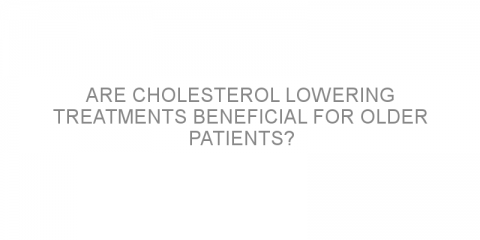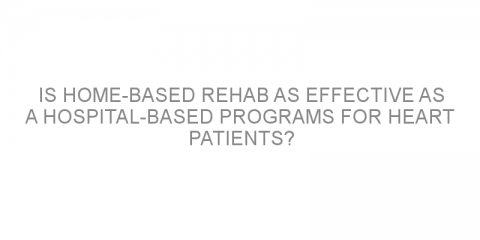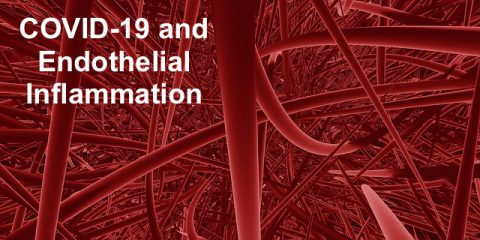In a nutshell This review offers recommendations for adults with high blood pressure, high cholesterol, or other risks for heart attack or stroke. Some background Cardiovascular disease (CVD) puts people at risk of heart attack, heart failure, and stroke. Risk factors for CVD include high blood pressure, being overweight, and unhealthy blood...
Read MoreCoronary artery disease Posts on Medivizor
Are cholesterol lowering treatments beneficial for older patients?
In a nutshell This study looked at the effect of cholesterol-lowering drugs in older patients. They found that lowering cholesterol levels led to a significantly reduced risk of heart attack, stroke, and death in these patients. Some background High cholesterol is one of the leading causes of heart disease. LDL cholesterol is a type of...
Read MoreDo reduced lipoprotein (a) levels lead to a reduction in heart events?
In a nutshell This study looked at the effect of alirocumab (Praluent) on lipoprotein (a) levels in patients at high risk of serious heart complications. They found that high lipoprotein (a) levels are associated with an increased risk of problems such as heart attack and stroke and lowering lipoprotein (a) levels by alirocumab treatment...
Read MoreIs home-based rehab as effective as a hospital-based programs for heart patients?
In a nutshell This study compared two cardiac rehab programs for patients with heart disease. One program is supervised in a hospital, while the other is done at home without supervision. They found that patients doing the rehab program at home started the program more quickly and had better outcomes. Some background After a heart attack or...
Read MoreCan a Mediterranean diet improve heart health?
In a nutshell This study looked at the effects of two different diets on patients with heart disease. They found that compared to a low-fat diet, a Mediterranean diet leads to better recovery of the heart’s blood vessels. Some background Heart disease is a major cause of disability and death. Heart attacks are usually due to blockages...
Read MoreCOVID-19 and Endothelial Inflammation
In May, the Journal of Clinical Medicine published an article titled “Hypertension, Thrombosis, Kidney Failure, and Diabetes: Is COVID-19 an Endothelial Disease? A Comprehensive Evaluation of Clinical and Basic Evidence.” The authors put forward a hypothesis that SARS-CoV-2 infects the lining of the body’s blood vessels. The lining...
Read MoreDo fruits and vegetables improve heart health?
In a nutshell This review looked at the relationship between fruits, vegetables, and heart disease. It found that both fruits and vegetables were related to lower rates of heart disease, heart attack, and stroke. Some background Fruits and vegetables have been considered a cornerstone of a heart-healthy diet for decades. These foods are high in fiber,...
Read MoreComparing pitavastatin alone to combination therapy with fenofibrate for reducing cholesterol levels
In a nutshell This study compared the effectiveness and safety of pitavastatin (Livalo) alone to combination therapy with fenofibrate (Tricor) for patients with dyslipidemia (high blood fats). The study showed that combination therapy was more effective in lowering the levels of harmful fats in the blood. Some background...
Read MoreDo beta-blockers and renin-angiotensin system inhibitors reduce the risk of events after coronary revascularization?
In a nutshell This study investigated if certain types of anti-hypertensive drugs (AHTs) reduce risks after revascularization procedures for a heart attack. They found that beta-blockers (BBs) and angiotensin-converting enzyme inhibitors/angiotensin receptor blockers (ACEIs/ARBs) reduce cardiovascular events (CVEs) after revascularization. Some...
Read MoreCan an eye exam predict the risk of heart attack or stroke?
In a nutshell This study investigated whether patients who have damage to the blood vessels in the eye are at greater risk of heart complications. They found that patients who had subtle damage to the blood vessels in the eye were more likely to suffer from major heart problems such as heart attack, heart failure, stroke, or death. Some background...
Read MoreThe use of colchicine in patients with chronic coronary artery disease.
In a nutshell This trial was carried out to assess the use of colchicine (Colcrys) in reducing the risk of cardiovascular events (CVE) in patients who have chronic coronary artery disease (CAD). The trial found that the risk of CVE was significantly lower in patients who received colchicine when compared to placebo. Some background...
Read MoreManaging non-ST elevation myocardial infarction in the elderly – is an invasive or non-invasive approach more suitable?
In a nutshell This study investigated the management of non-ST elevation myocardial infarction (NSTEMI) in elderly patients. They found that invasive management had better survival rates for these patients. Some background Coronary artery disease (CAD) is caused by reduced blood flow to the heart. This can be caused by blockages. CAD can...
Read More














